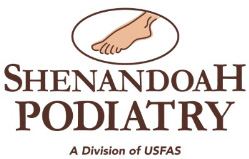Shockwave therapy is a non-invasive treatment that stimulates the body’s natural healing processes. At Shenandoah Podiatry, shockwave therapy is one of the treatment options we offer to address foot and heel pain, including Achilles tendinitis and plantar fasciitis. Also called extracorporeal shockwave therapy (ESWT), this innovative solution can relieve pain and accelerate healing. Our VA podiatrist explains more about ESWT, how it works, and whether it may be right for you. 
Understanding ESWT
Approved by the FDA, ESWT is a safe and innovative therapy that treats a range of conditions that affect many areas of the body, including the foot and heel. It can be effective for treating both chronic and acute musculoskeletal pain.
Shockwave therapy does not send electricity through the body. Rather, treatments involve sending high-pressure acoustic waves through affected areas. The “extracorporeal” part of the name refers to the non-invasive nature of ESWT. The treatment is applied from outside of the body on the surface of the skin. It is fast, gentle, and effective.
How Does ESWT Work?
As a type of regenerative medicine, ESWT stimulates the body’s natural responses and does not involve any surgery or medication. Instead, high-pressure shockwaves travel through the skin to the injured tissue. The radial shockwaves set several natural processes into motion. This promotes the body’s ability to heal itself by:
- Increasing blood flow
- Sending nutrients and growth factors to the affected area
- Constructing new blood vessels
- Increasing metabolism
- Increasing cell regeneration
- Repairing damaged tissue
- Breaking up calcium deposits (fibroblasts) to make room for healing
- Inhibiting neurotransmitters that cause intense pain
How Many Treatments Do You Need?
Each shockwave treatment session typically takes about 10 minutes. Depending on your injury or foot condition, a treatment plan may involve three weekly sessions, but you will work with your doctor to determine the right number of treatments for you. Dr. Jennifer Keller and Dr. Natalie Allen may offer ESWT in parallel with other podiatry treatments.
Are Shockwave Treatments Safe?
The technology used in shockwave therapy has been approved by the FDA. Extensive clinical studies have confirmed both its safety and efficacy. ESWT was developed in Europe as a treatment for kidney stones and has since been adapted for other uses, such as treating foot and heel pain. There are virtually no risks or side effects associated with ESWT, although a small number of patients may experience minor discomfort. Pain from ESWT varies from patient to patient, but most people describe ESWT as slightly uncomfortable rather than painful.
Like all medical treatments, shockwave therapy may not be for everyone. It may not be the right choice for patients with certain heart conditions or blood clotting disorders. Patients prone to seizures or with preexisting infections may not be good candidates either. Ask Dr. Keller or Dr. Allen if ESWT is right for you.
The Benefits of Shockwave Treatment
When you meet with the team at Shenandoah Podiatry, we will thoroughly examine your feet and ankles to identify the cause of your pain. After we make a diagnosis, we’ll discuss possible treatment options, including ESWT. We may recommend other treatments if we believe these options will be more effective. There are many benefits to shockwave treatment for addressing foot pain.
- Completely non-invasive
- No need for medication, surgery, or injections
- No anesthesia is needed
- No required aftercare or downtime
- Zero risk of infection or scarring
- Short treatment sessions of approximately 10 minutes
- Few to no complications or side effects
- May offer immediate pain relief after treatment
- High levels of reported success rates
- Strong clinical results
- Encourages the body’s natural healing processes
ESWT Can Help Treat Many Conditions
Many patients who come to our Virginia podiatry clinic may benefit from shockwave therapy. ESWT can be used to treat a variety of foot and heel conditions, including:
- Chronic heel pain
- Heel spurs
- Achilles tendinitis
- Achilles pain
- Plantar fasciitis
- Shin splints
- Foot neuromas
- Stress fractures
- Ankle sprains
- Post-surgery recovery

